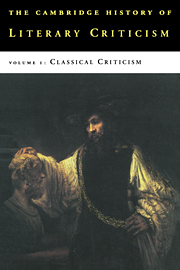Book contents
- Frontmatter
- 1 Early Greek views of poets and poetry
- 2 Language and meaning in archaic and classical Greece
- 3 Plato and poetry
- 4 Aristotle's poetics
- 5 The evolution of a theory of artistic prose
- 6 Hellenistic literary and philosophical scholarship
- 7 The growth of literature and criticism at Rome
- 8 Augustan Critics
- 9 Latin Criticism of the Early Empire
- 10 Greek Criticism of the Empire
- 11 Christianity and Criticism
- Bibliography
- Index
- References
9 - Latin Criticism of the Early Empire
Published online by Cambridge University Press: 28 March 2008
- Frontmatter
- 1 Early Greek views of poets and poetry
- 2 Language and meaning in archaic and classical Greece
- 3 Plato and poetry
- 4 Aristotle's poetics
- 5 The evolution of a theory of artistic prose
- 6 Hellenistic literary and philosophical scholarship
- 7 The growth of literature and criticism at Rome
- 8 Augustan Critics
- 9 Latin Criticism of the Early Empire
- 10 Greek Criticism of the Empire
- 11 Christianity and Criticism
- Bibliography
- Index
- References
Summary
The name ‘Silver Latin’ is often given to the literature of the first century of the Christian era and is generally understood to imply its inferiority to the Golden Age of the late Republic and Augustan era. Analogy with the five Hesiodic ages, in which the silver age was both later and less worthy than the golden, suggests the cliché of decline. To what extent did the Romans of the early imperial period feel that they and their contemporaries were a falling away from the previous generation? We will see that the change in form of government, by denying opportunities for significant political speech, trivialised the art of oratory. But was there any such external constraint on poetry?
Modern critics have reproached Silver Latin epic and tragedy with being ‘rhetorical’. Certainly it is clear from Tacitus' Dialogus that men thwarted from political expression transferred to the safer vehicle of historical or mythical poetry both the techniques and ideals of public oratory. But just as no one suggests that Juvenal's satires were poorer compositions because of his apparent rhetorical skill, so rhetorical colouring in the higher poetic genres of tragedy and epic is not necessarily a fault. We would judge the individual composition primarily by its internal coherence: but Roman critics like Quintilian measured a work by its conformity to the characteristics of its genre and defined those characteristics by a canon, which by his time consisted largely of late-Republican and Augustan writers. Thus for classicising critics of the first century ‘different’ meant worse, while the creative artists who achieved significant poetry or prose did so largely in reaction against a norm they could not usefully imitate.
- Type
- Chapter
- Information
- The Cambridge History of Literary Criticism , pp. 274 - 296Publisher: Cambridge University PressPrint publication year: 1990

